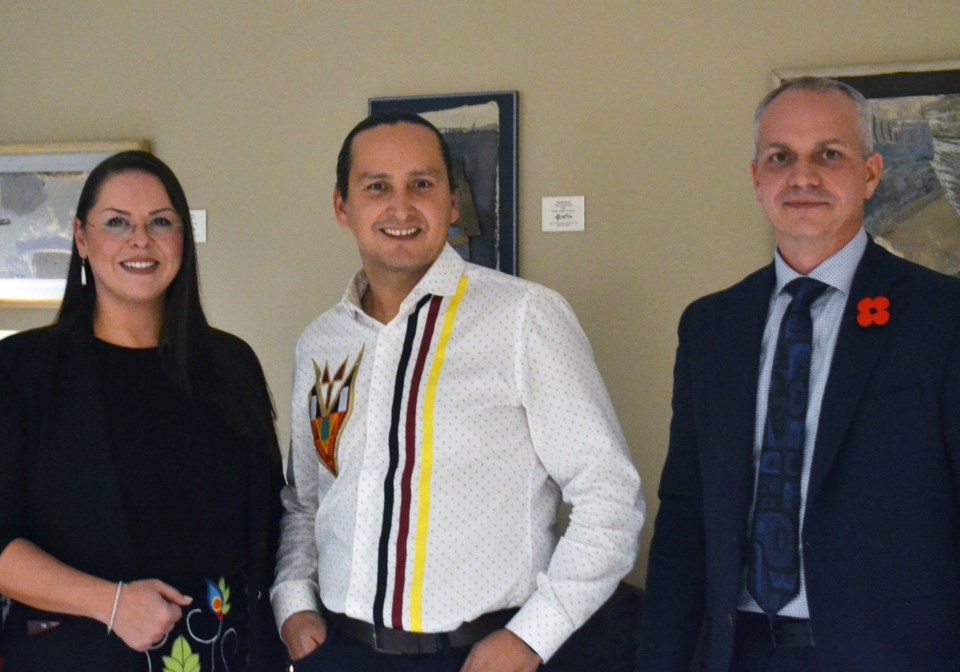PRINCE ALBERT - The seats of the E.A. Rawlinson Centre were filled during Chief Cadmus Delorme’s presentation on truth and reconciliation on Nov. 2, with hundreds of members of the Prince Albert community looking to engage in a deeper conversation of what it means to be a Canadian in a time of healing.
“Prince Albert is a city that, like many in this province, is addressing the truth and finding a way for reconciliation for a better today and tomorrow,” said Cowessess First Nation Chief Cadmus Delorme. “The hope is that when I leave, that conversation will continue on what reconciliation means and the stronger relationship with Indigenous people and Canadians.”
Delorme’s presentation touched on tough topics, like the discovery of the 751 unmarked graves found on the site of the former Marieval Indian Residential School on the Cowessess First Nation in June of 2021, and how validation can be used as a healing tool.
“Nobody today created the Indian Act, residential schools, (or) the Sixties Scoop. We inherited this,” said Delorme. “It’s tough to move to reconciliation when many of us are still trying to accept and understand the truth. It’s really good to acknowledge what reconciliation is, but I do believe it’s frustrating for many, because we can take two steps forward and it takes one event where we’re like, three steps back. So, we have to understand this is a journey, it’s a means to an end.”
The news of the tragic discovery reached countries across the world, all in shock of what was kept hidden in Canada’s past. Delorme spoke with reporters from as far as China and was even featured on an episode of Sixty Minutes with Anderson Cooper.
“It is eye-opening when international countries are reaching out to Cowessess, to myself, to ask questions. My comment to them is that Canada is going to get this right, and when we get Truth and Reconciliation right, international countries that have a similar history are going to come here and ask us how we did it. I truly am optimistic that we’re going to get there.”
Delorme was excited to share his presentation in Prince Albert, a city he says is near and dear to his heart. His life-long love for golf always brings him back to one of his favourite golf courses in the province, Cooke Municipal Golf Course.
Deputy Chief of the Prince Albert Police Service, Farica Prince, is a childhood friend of Delorme’s and one of the reasons Wednesday night’s event was such a success.
“I’ve heard Chief Cadmus Delorme many times and I’m consistently impressed with his communication skills. What makes [him] so unique is his ability to deliver the message without losing the crowd,” she said. “It’s his humor, it’s his compassion, it’s his ability to speak truth without causing people to get defensive.”
Prince explained that Canadian Tire owner and sponsor of the event, Malcolm Jenkins, reached out to her after watching Delorme talking about the discovery of the mass gravesite on Sixty Minutes, and together they were able to organize the Chief’s visit to Prince Albert.
“It all started with a conversation,” said Prince. “Malcolm was basically taken aback and he was demonstrating a commitment to learning. He asked the question, what can we do here in Prince Albert and how do we advance truth and reconciliation? Now we have seen the entire community come together to bring Chief Cadmus here to Prince Albert and we’re really excited that happened.”
Police Chief Jon Bergen said the first time he heard Delorme’s message, he was inspired to share it with the members of the Prince Albert Police Service and the greater Prince Albert community as a whole.
“I think back to when I first heard Chief Cadmus Delorme deliver a message, it was quite a few years ago. I was in Regina at the time and I was really impacted by the message, such an important message and one that I still remember today,” said Bergen. “Tonight, on a much larger scale than I ever thought about initially, we get to hear that message. I believe it’s going to be one that’s delivered at a really important time. It’s going to be a message about many things, but most importantly about truth. Because of that, we’re going to continue to understand where we came from and where we are today.”
Delorme said traveling to different cities to spark important conversations about truth and reconciliation is just playing his role.
“I’m a proud Indigenous person, I’m a proud Saskatchewanian, [and] I’m a proud Canadian,” he said. “I got little kids, I got survivors of residential school that look for hope, and I’ll continue doing that one day at a time.”




